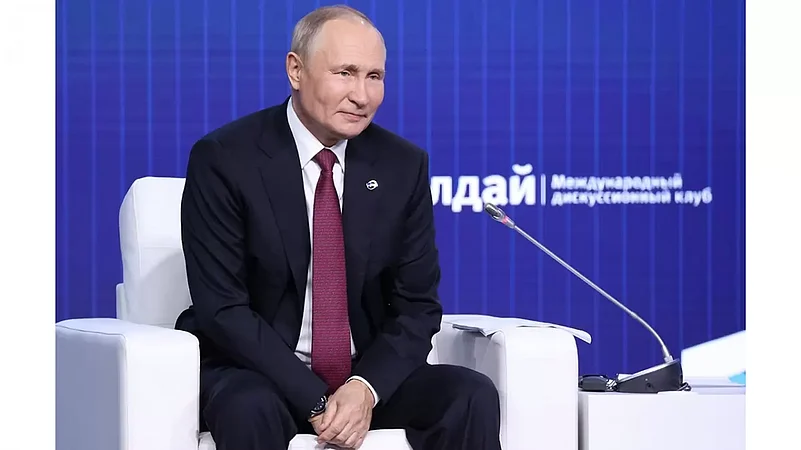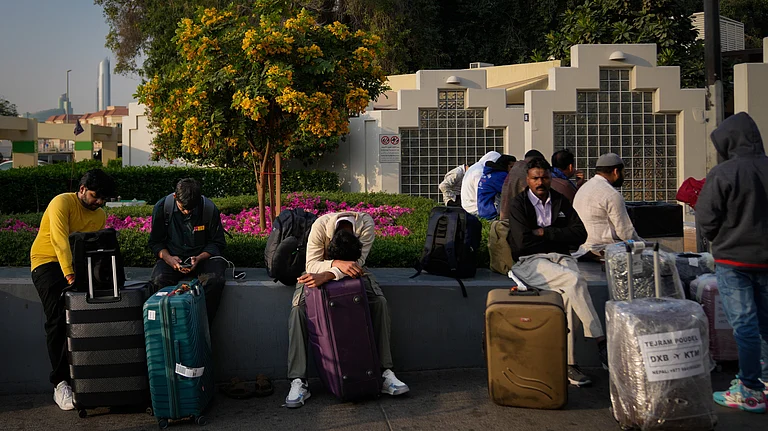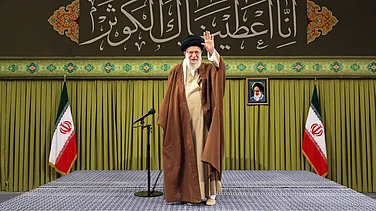One section of the Petersburg International Economic Forum (PIEF), which was organised earlier this month, was devoted to the Russia-India business dialogue. At first glance, its agenda had an exclusively positive character. In particular, participants spoke about the growth of trade between Moscow and New Delhi which increased by 250 per cent last year and was valued at $35 billion. Among the main areas of cooperation were Indian investments in the Far East, the energy sector, the needs of the Russian market for Indian pharmaceutical products, etc.
However, despite the peace-loving appearance of the agenda, it is important for the ‘Global South’ to exercise caution when dealing with Moscow, whose politicians do not hide their desire to draw non-Western countries into their conflict with the United States and Europe.
How Russia wraps actions in fight against ‘Western Yoke’
Recently, Sergei Karaganov, Chairman of Presidium of the Russian Council for Foreign and Defense Policy, once again formulated the main narrative of the Kremlin in relation to the countries of Africa and the Pacific regions. In his words, “the tendency in recent years is the liberation of the world from the western yoke”, and Russia supposedly leads the process of liberation of all “post-colonial” states.
He said, “From the Western perspective, there is now a struggle to preserve the remnants of neo-colonialism while from the side of the rest of the world — liberation from it. Once again, we are at the forefront of this struggle and we are a kind of icebreaker that is finishing off the residual ice of the neo-colonial system of Western domination.”
Karaganov is far from the only one espousing the idea of Russia as the flagship of the struggle against ‘neo-colonialism’. During the first months of full-scale Russian aggression against Ukraine, Russian Foreign Minister Sergey Lavrov also declared that “the Russian military operation in Ukraine contributes to the liberation of the world from the neocolonial oppression of the West”.
New tendencies of Russia
Still earlier, one of the most influential Russian analytical centers, the Valdai Discussion Club, prepared the scientific groundwork for such narratives.
In particular, in 2021, the club’s experts singled out the economic growth and corresponding international influence of India, China, and other Asian states as one of the main trends of the modern world, which will be accompanied by the division of the world into so-called techno-economic blocs that compete fiercely with one another.
They said Russia should lead its own techno-economic bloc and propose new rules for international relations and economic structure which would help this bloc resist the “neo-colonial pressure of the West”. Valdai experts explained that only Moscow is capable of becoming the guarantor of security and technological sovereignty in the region.
When speaking of this theory, it is important to note that it is much more complicated that the propaganda narratives usually spread in Russia. The Russian experts quite accurately note the actual trends taking place in the world. Countries that only a few years ago played no substantive role in international politics are now developing rapidly economically which leads inevitably to the growth of their political influence and independent decision-making. This is a positive trend. For India and other countries, it is vitally important to be truly sovereign and independent economically-attractive players.
It is also hard to argue against the idea of forming techno-economic blocs and the growth of competition among the leading powers, such as the United States and China. However, the devil, as they say, is in the details. In trying to present itself as the engine and primary guarantor of these processes, Moscow is in fact trying to employ them in its own interests. In practice, this can result in discrediting Russian allies and become a significant hindrance to their economic development.
Peaceful competition or bloody chaos?
First, it is important to note that changes in the configuration and balance of power in world politics is an objective process which does not depend on Moscow’s efforts. But Moscow had been trying for years to influence the form it will take. In particular, even before the start of the full-scale war against Ukraine, Russian experts assured that the growing strength of new players on the world stage would lead inevitably to a new division of the world which, as it did 100 years ago, could be accompanied by world wars and other global upheavals.
In fact, the Kremlin bet on such a bloody division, hoping to use it to justify its incursion into a neighboring state. But it is obvious that for India and other states a constructive and peaceful variant of development is preferable to bloody wars for territory that could not only set back the region’s countries by several decades, but also cause them irreparable damage. The beginning of the war in Ukraine opened a most dangerous ‘Pandora’s box’ which threatens to introduce a much more dangerous scenario of technological change.
Kremlin experts make no secret of the fact that even today they want to draw potential allies into their confrontation with the West. For example, Andrey Bezrukov, one of the main ideologues of the need for Russia to move closer to India and China and develop BRICS and Shanghai Cooperation Organisation (SCO), calls “the formation of another world” in which “Russia’s enemies” do not have a majority “the most important theater of military operations”.
Despite the fact that many countries prefer to maintain their neutrality in the confrontation between Russia and the Western world, Kremlin ideologues insist that “India and China oppose the West on the side of Russia”, thereby drawing other states into a conflict they certainly do not need.
Second, the harmonious development of the countries of the Pacific region requires skillful balancing between different partners and the possibility to enter different markets. By contrast, Russia’s war with Ukraine requires other countries to make an undesirable choice between Russia and the West — a choice which most neutral states would prefer to avoid.
On the one hand, Moscow itself is pushing potential allies to make this choice through the above-mentioned attempts to attract them to its side in the conflict. In this regard, Kremlin experts do not hide the fact that they are trying to manipulate their foreign colleagues, playing on their colonial past. As for India, they point out that American “efforts to preach morality and dictate a way of life are perceived by the Indian elite and the masses quite painfully, seeing in them an echo of the post-colonial arrogance characteristic of Western countries”.
They advise using the potential for friendly relations developed in Soviet times to bypass sanctions in the present and convince their Eastern partners that the current policy of the United States and the West is a revival of colonialism and “exploitation of Third World countries”.
The need to choose
On the other hand, the application of sanctions against Moscow also prevents the preservation of full-fledged economic ties with both the West and Russia. The propagandists call these sanctions “an approbation of the mechanism of global neocolonialism under the auspices of the United States” but it’s clear that they were introduced in response to very specific actions — the initiation of an aggressive and annexationist war. Without this, the West could not have introduced anti-Russian sanctions or freeze its gold and foreign exchange reserve, even if it wanted to do so.
It is precisely because of the Kremlin’s actions that India and other countries must face the need to choose, which inevitably limits their trade and economic possibilities. Russian experts do not hide the fact that it was after the “special operation” launched by Moscow in Ukraine that “even those countries that did not openly say where they would go and with whom are now forced to decide”.
The representatives of India, contrary to the assurances of Russian propaganda, do not believe that this need contributes to its development. On the contrary, former Indian ambassador to Russia Pankaj Saran at a round-table on Russia-India relations noted that “for India, the conflict over Ukraine began at the wrong time” and, as a result, “development plans had to be adjusted”.
Imperial wars and the chaotization of neighboring countries
Third, the very thesis that the war unleashed by Russia is a “fight with neo-colonialism” is a priori a lie inasmuch as Moscow’s aggression in Ukraine is itself a purely imperial war caused by the inability of the metropolis to come to terms with the independence of its former colony. That which Russia calls “liberation” is in fact the complete destruction of Ukrainian cities that until the Russian invasion were entirely peaceful and flourishing, such as Mariupol, Bakhmut, and others.
The idea that Russia itself was under the ‘neo-colonial yoke’ of the West likewise does not withstand criticism at a minimum because we saw with our own eyes the inability of Western countries to affect the aggressive tendencies of Moscow either in 2008 or 2014. In any case, even if one could imagine that such a yoke existed, the bombing of Ukrainian cities in no way facilitates liberation from it.
Fourth, the Kremlin constantly declares that Russian technologies can provide Moscow’s allies with true sovereignty, while the United States will never give up the idea of controlling the systems they supply. However, this statement also does not hold water against the background of how Russia seeks to ensure full control over the internet space in its own country. This is not only about censorship on the network but also about the constant attempts of Russian special services to gain access to the confidential correspondence of users.
Also, according to pro-Kremlin experts, Russia would be an exporter of international security. This thesis looks especially bright in combination with an article by another Kremlin ideologist, Vladislav Surkov, who directly called on the Russian authorities to export chaos to neighboring countries and solve internal problems through external expansion.
“The Crimean consensus is a vivid example of the consolidation of society due to the chaos of a neighboring country,” Surkov frankly admitted.
Thus, we can conclude that the behavior of modern Russia not only does not contribute to the development and strengthening of its potential allies, but, on the contrary, slows down these processes and threatens to use peaceful integration mechanisms as an instrument of its ‘hybrid’ aggression. At the same time, it is obvious that the world needs a peaceful and responsible Russia that could become a reliable and economically attractive partner capable of balancing the existing centers of power and effectively interacting with both Western and Eastern neighbors. However, unfortunately, modern Russia is extremely far from this ideal.
(Ksenia Kirillova is a US-based expert on Russia. She is an investigate journalist and an analyst at Washington DC-based think tank Jamestown Foundation. Views expressed are personal.)

















